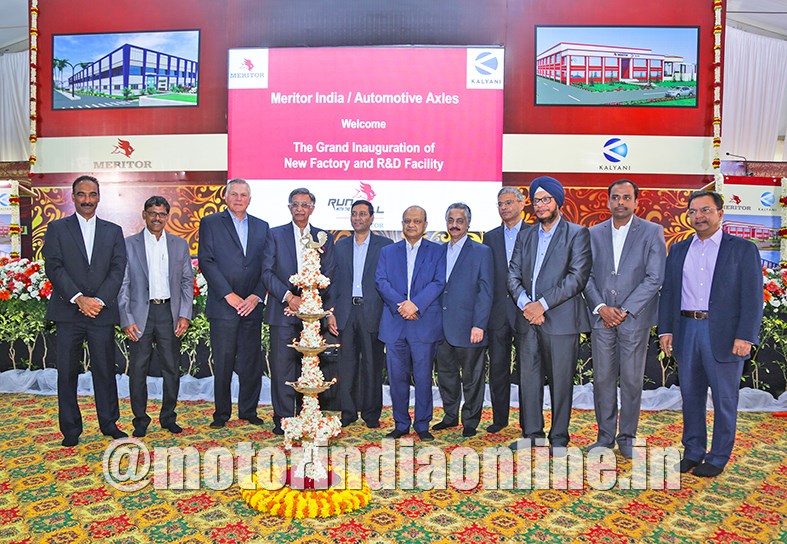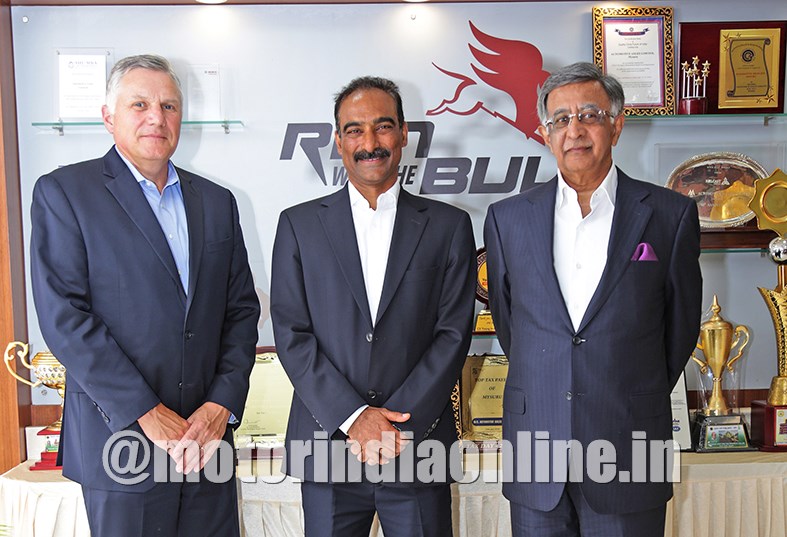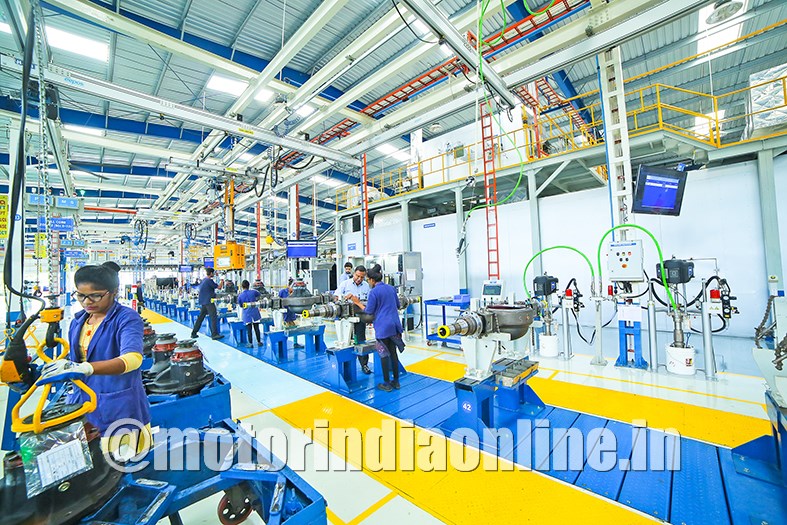Meritor Inc. and Kalyani Group have further strengthened their partnership by opening a brand-new axle assembly facility at Automotive Axles in Mysore besides a state-of-the-art research and development centre. Sarada Vishnubhatla visits the facility and reports

A powerful statement has been made in the face of obvious symptoms of slowdown impacting not just the Indian economy – with sluggish manufacturing growth pegged at 7% – but the global one too. Meritor India recently inaugurated an axle assembly facility and a state-of-the-art research and development centre at Automotive Axles in Mysore. Automotive Axles is a joint venture between Meritor Inc. and Kalyani Group that manufactures drive and non-drive axles, front steer axles, specialty and defence axles besides drum and disc brakes and suspensions.
Meritor India has manufacturing facilities spread across Mysore, Jamshedpur, Hosur and Pantnagar, and its engineering centres are present in Bengaluru and Mysore. With an aftermarket distribution centre in Pune, the company boasts of over 120 retail outlets across the country and also has presence in Sri Lanka, Bangladesh and Nepal.
Speaking on the occasion, Jay Craig, CEO – President, Meritor Inc., said: “This is part of our global business growth and the new facility in India supports our strategic plan to retain our market leadership with best-in-class products and services.”
Presiding over the inauguration was Dr. Baba N. Kalyani, Chairman of Kalyani Group, who shared: “We are capable of evolving fast by developing testing technology here at Automotive Axles and this helps us improve our market position. We believe in continuous innovation of our products and processes.”

Thimmaiah Napanda, Managing Director and CEO, Meritor India & Vice President – India and Australia, Meritor Inc., added: “The new partnership indicates to the expansion of Meritor India’s production capacity by 25% and equips us to cater to sectors including commercial vehicle and defence – though a small segment in itself – and off-highway sectors. The R&D centre will focus on end-to-end testing and validation of Meritor’s domestic and global product solutions.”
Partners in success
The partnership draws attention to the robust relations shared between Meritor and the Kalyani Group. “Both the entities are inherently strong and that is why we continue to invest even when the markets are weak. Our strategy draws upon this strength to continue to plan to grow in the global and Indian markets. We will continue to create market-leading products and differentiate ourselves from the competition,” Craig said. The idea is to be near the customers not only in India but for the facility to act as a global platform for exports. Meritor India does two types of exports – first, most of their subsystems are exported to global Meritor centres to serve their end customers; second, they supply directly to OEMs in different geographies.
Referring to the Mysore facility, Craig explained: “The proximity of this centre allows for our products to enter the market quickly so that our customers do not have to rely on the resources elsewhere in the world. While many product testing facilities are run globally, there is testing done in India as well as for the world.” Currently, Meritor India manufactures drivetrains, braking and suspension systems for on and off-highway and military applications.
Defence segment:
An attractive target
Even though the Indian defence vehicle segment is small, upgradation is being witnessed definitely, slowly yet steadily. Bharat Forge, a Kalyani Group company which caters to Indian OEMs manufacturing defence vehicles, and Meritor with their recent acquisition of Axle Tech hope to service the sector to their full capability. “Now we are beginning to see defence vehicles being equipped with independent suspensions, enabling them to be multi-terrain besides some high-end military specific applications. This is promising when compared to the traditional method of modifying regular buses and trucks to suit military applications,” Napanda pointed out. Bharat Forge is also getting more and more into supplying defence equipment in the equipment-carrying vehicles and Meritor provides the under-chassis items for OEMs including the multi-axles and suspension systems. Dr. Kalyani added: “But the defence market share is small. More than 60% of their axles come from us.”

Keeping system lean
The new manufacturing set up is Industry 4.0-enabled. And Meritor sees merit in adopting ‘de-skilling’ of operations so that the dependency on highly skilled workforce is minimised. Napanda elaborated: “De-skilling in the new facility allows us to perform operations with low-skilled operators too. That way we can use the services of fewer highly skilled engineers who can control the backend.” This is already a norm with the Kalyani Group, where skilled workforce manages the shop floor by monitoring most processes on computers. “It eliminates the need for a maintenance engineer on the work floor. Sensors on the machines communicate what is going wrong, where and in which machine. This way trouble-shooting is almost immediate,” Dr. Kalyani elaborated.
Gauging the EV impact
The reality of electric vehicles is dawning fast on the Indian horizon. If an increasing number of start-ups are building prototypes of fully electric heavy vehicles like trucks, the latest reports from the concerned Indian ministry assures that all the buses will be electrified in the next two years. Hence, it is only natural for Meritor India and Kalyani Group to prepare for the potential impact to the business. Dr. Kalyani shared: “Electric vehicles are forcing the industry to think how to develop technology in different areas. But in conventional vehicles, such as trucks, I feel not more than 10% will be electrified for a long time.”
According to Craig: “Most global forecasting agencies and Meritor predict that by about year 2024, approximately 10% of CVs will be battery electric vehicles (BEV) with over half of that population in China – which already is dictating in certain categories for BEV applications such as transit buses, where 60% of the segment is already fully electric. The application rate drops significantly outside of China. Big applications are mainly in the intra-city transit bus, refuse vehicles, port vehicles, and the like. Beyond that, we see it to be minimal in the traditional CVs.”
Despite that forecast, Meritor is determined to be a market leader in electric drivelines.
Napanda added: “Our new axle assembly facility is ready to make electric axles as well, and fortunately for Meritor, the drivetrain is coming to the axle and not to the engine or the transmission. We are determined to make sure that we offer the best technology in that space.” Meritor officials also mentioned launching EV prototype vehicle programs ‘with almost every OEM in the world’, yet it is not “economically viable at this moment”. Recounting the challenges involved, Craig said: “Until the change in the chemistry of batteries makes their cost drop well below $100 a kilowatt hour, it will remain uneconomical. The other challenge is regulatory where more global cities besides Paris, London and New York, among others, need to strictly implement ‘green-only zones’.
Industry slowdown
Talking about the industry slowdown, Dr. Kalyani said: “Honestly, the scenario is not changing drastically. The current gap between the demand and supply is around 25%. We remain hopeful for a powerful stimulus to trigger the narrowing down of it.” Meritor officials too sounded confident despite the natural and cyclical nature of the industry. And there is enough reason to be upbeat considering that with strategic planning and matching investment, the joint venture is bound to reap the expected benefits in the times to come.